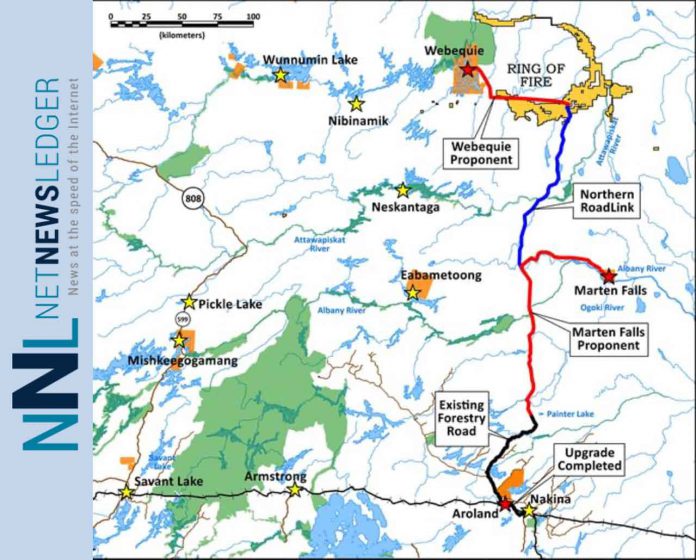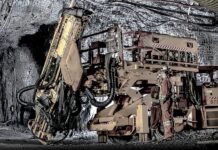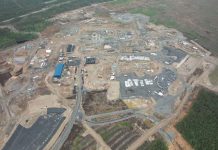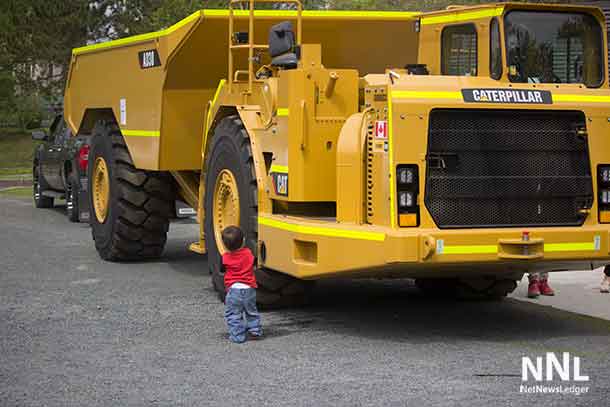THUNDER BAY – MINING – Chiefs of the Matawa First Nations of Northern Ontario announced today they are working towards solidifying a regional approach to the federal Impact Assessment (IA) in the Ring of Fire.
This announcement was made during the Matawa Chiefs Council’s participation in the Prospectors and Developers Association of Canada’s 2022 convention which was hosted in person in Toronto from June 13-15 and online from June 28-29.
“Ginoogaming First Nation is a signatory to Treaty #9 historically as Long Lake #77, and will participate within the Spirit and Intent of Treaty #9 to share the land and resources. Although now that the Federal and Provincial governments hide behind non-derogation clauses and process, it is important for our People to begin taking a position on lands and resources based on Treaty,” says Chief Sheri Taylor, Ginoogaming First Nation.
In addition to previous approaches to work with federal/provincial governments on the issue—some of the areas they are reviewing, amongst others, are: Constitutional level impacts, previous work on decision-making, strengthening relationships with other First Nations who share the same watershed, community and other reports on the matter, and their 2021 call for meaningful and significant inclusion of First Nations in the federal Impact Assessment Agency process for the proposed Ring of Fire development Regional Assessment which, to-date, has not been answered.
As part of their meeting that took place on June 11 and 12, 2022, the Matawa Chiefs Council are looking at jointly run studies and a process that focus on the ‘big picture’ of multiple projects throughout shared lands. They also discussed how they can work collaboratively to form a committee/Indigenous Governing Body/Commission to oversee and co-lead the Regional Assessment and how they can move forward with an opportunity to involve communities together in a new way on a core set of priorities and objectives. They discussed how the work would potentially link to national or international obligations, such as climate change commitments and the United Nations Declaration on the Rights of Indigenous Peoples (UNDRIP). They also discussed ways a regional assessment process can be set up for the people from the Matawa communities to have an opportunity for a direct voice in a different way that they have in the past.
While no decisions have yet been made, the Matawa Chiefs Council will be continuing their discussions on the regional approach at their 34th Annual General Meeting scheduled to take place in Webequie First Nation from July 26 – 28, 2022.
“We fully understand that it is not just 1 corridor is needed to be opened for mining, it’s really a thousand corridors that will open from that 1 corridor. Because there isn’t a road into our territory—our People are free to live our Anishinabek identity. We need Mother Nature to be intact to nurture us in our healing from colonization in Canada,” said Ogamakan Michael Sugarhead, Nibinamik First Nation.
“We will not lose our voice for the land. We will not give up on our responsibility to speak and advocate for the land which forms our way of life. Any changes to it will be irreversible and we take that very seriously because losing our land to development has great potential to be tantamount to the genocide of our People. We want a process that respects First Nations’ protocols and our People need to have a direct voice,” commented Chief Wayne Moonias, Neskantaga First Nation.
“A re-focus on how impact and environmental assessments are done in northern Ontario is needed. A decade has passed since we began talking about the Ring of Fire, and from our perspective, we are nowhere near resolution on the matter. Canada’s reconciling of their relationship with Indigenous People must include the stopping of its continued infringement of Inherent, Aboriginal, and Treaty rights,” adds Chief Ramona Sutherland, Constance Lake First Nation.








